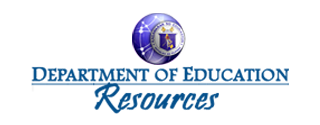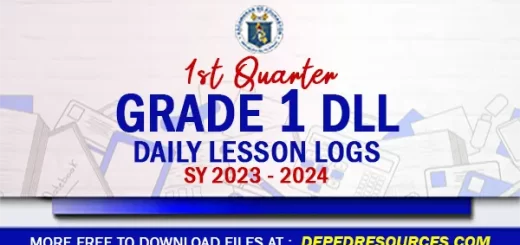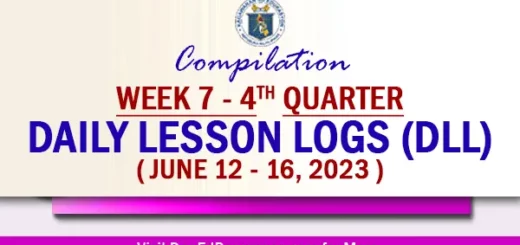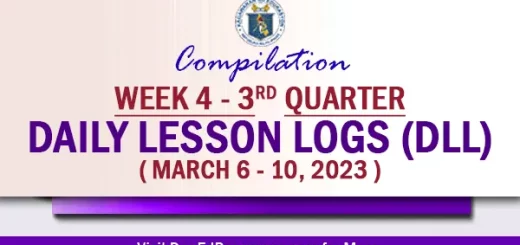Grade 1 Daily Lesson Log – 4th Quarter | DepEd Resources 2019
At DepEd Resources, you will find the download links for the Grade 1 Daily Lesson Log – 4th Quarter | DepEd Resources 2019 after the article below. You may read the following article or you may scroll down DepEd Resources directly for the download links.
Parts of a K-12 Daily Lesson Log (DLL)
- Objectives
- This part of the DLL includes objectives related to content knowledge and competencies. Lesson objectives describe the “kinds of content knowledge and processes teachers hope their students will learn from instruction. The lesson objectives describe the behavior or performance teachers want learners to exhibit in order to consider them competent. The objectives state what the teacher intends to teach and serve as a guide for instruction and
assessment. - The content standards refer to the learning area-based facts, concepts, and
procedures that students need to learn, while the competencies pertain to the
knowledge, skills, and attitudes that students need to demonstrate in a lesson. The
competency codes are also logged in this part of the DLL.
- This part of the DLL includes objectives related to content knowledge and competencies. Lesson objectives describe the “kinds of content knowledge and processes teachers hope their students will learn from instruction. The lesson objectives describe the behavior or performance teachers want learners to exhibit in order to consider them competent. The objectives state what the teacher intends to teach and serve as a guide for instruction and
- Content
- The topic or subject matter pertains to the particular content that the lesson focuses on.
- Learning Resources
- This part of the DLL asks teachers to log the references and other learning resources that the teacher will use for the lesson. The references include the particular pages of the TG, LM, textbook, and the
additional materials from the LRMDS portal. The other learning resources refer to materials such as those that are teacher-made, authentic, and others not included in the references. This part of the DLL can also include the supplies, equipment, tools and other non-print materials needed for activities before, during, and after the lesson.
- This part of the DLL asks teachers to log the references and other learning resources that the teacher will use for the lesson. The references include the particular pages of the TG, LM, textbook, and the
 Procedures
Procedures
- This part of the DLL contains ten (10) parts including:
- a) reviewing previous lesson/s or presenting the new lesson.
- b) establishing a purpose for the lesson will motivate the learner to learn the new lesson.
- c) presenting examples/instances of the new shows instances of the content and competencies.
- d) discussing new concepts leads to the first formative assessment.
- e) continuation of the discussion of new concepts leading to the second formative assessment that deepens the lesson and shows learners new ways of applying learning.
- f) developing mastery, which leads to the third formative assessment, can be done through more individual work activities such as writing, creative ways of representing learning, dramatizing, etc.
- g) finding practical applications of concepts and skills in daily living which can develop appreciation and valuing for students’ learning by bridging the lesson to daily living.
- h) making generalizations and abstractions about the lesson will conclude the lesson by asking learners good questions that will help them crystallize their learning so they can declare knowledge and demonstrate their skills;
- i) evaluating learning is a way of assessing the learners and whether the learning objectives have been met.
- j) additional activities for application or remediation will be based on the formative assessments and will provide children with enrichment or remedial activities.
- Flexibility is allowed in the delivery of the DLL procedures. Teachers do not need to go
through all ten (10) parts in every lesson. Teachers need to ensure that the procedures
of the lesson lead to the achievement of the stated objectives. The formative
assessment methods to be used by the teacher should determine if the objectives of
the lesson are being met. These ten parts should be done across the week.
- This part of the DLL contains ten (10) parts including:
- Remarks
- This is a part of the DLL in which teachers shall indicate special cases including but not limited to continuation of lesson plan to the following day in case of re-teaching or lack of time, transfer of lesson to the following day in cases of class suspension, etc.
- Reflection.
- This part of the DLL requires teachers to reflect on and assess their
effectiveness. In this part of the DLL, the teacher should make notes on the number of
learners who earned 80% in the evaluation, the number of learners who require
additional activities for remediation and those who continue to require remediation,
the effectiveness of the remedial lesson, the teaching strategies or methods that worked well and why, and the difficulties teachers encountered that their principal or supervisor can help solve.
- This part of the DLL requires teachers to reflect on and assess their
Source: Department of Education
New! Grade 1 Daily Lesson Log – 4th Quarter
Week 1 Grade 1 Daily Lesson Log (January 14 – 18, 2019) (Update!)
- GRADE 1 Daily Lesson Log in ARALING PANLIPUNAN – 4th Quarter: Week 1
- GRADE 1 Daily Lesson Log in ENGLISH – 4th Quarter: Week 1
- GRADE 1 Daily Lesson Log in ESP – 4th Quarter: Week 1
- GRADE 1 Daily Lesson Log in FILIPINO – 4th Quarter: Week 1
- GRADE 1 Daily Lesson Log in MAPEH – 4th Quarter: Week 1
Week 2 Grade 1 Daily Lesson Log (January 21 – 25, 2019) (Update!)
- GRADE 1 Daily Lesson Log in ARALING PANLIPUNAN – 4th Quarter: Week 2
- GRADE 1 Daily Lesson Log in ENGLISH – 4th Quarter: Week 2
- GRADE 1 Daily Lesson Log in ESP – 4th Quarter: Week 2
- GRADE 1 Daily Lesson Log in FILIPINO – 4th Quarter: Week 2
- GRADE 1 Daily Lesson Log in MAPEH – 4th Quarter: Week 2
- GRADE 1 Daily Lesson Log in MATHEMATICS – 4th Quarter: Week 2
- GRADE 1 Daily Lesson Log in MTB – 4th Quarter: Week 2
Week 3 Grade 1 Daily Lesson Log (January 28 – February 1, 2019) (Update!)
- GRADE 1 Daily Lesson Log in ARALING PANLIPUNAN – 4th Quarter: Week 3
- GRADE 1 Daily Lesson Log in ENGLISH – 4th Quarter: Week 3
- GRADE 1 Daily Lesson Log in ESP – 4th Quarter: Week 3
- GRADE 1 Daily Lesson Log in FILIPINO – 4th Quarter: Week 3
- GRADE 1 Daily Lesson Log in MAPEH – 4th Quarter: Week 3
- GRADE 1 Daily Lesson Log in MATHEMATICS – 4th Quarter: Week 3
- GRADE 1 Daily Lesson Log in MTB – 4th Quarter: Week 3
Week 4 Grade 1 Daily Lesson Log (February 4 – 8, 2019) (Update!)
- GRADE 1 Daily Lesson Log in ARALING PANLIPUNAN – 4th Quarter: Week 4
- GRADE 1 Daily Lesson Log in ENGLISH – 4th Quarter: Week 4
- GRADE 1 Daily Lesson Log in ESP – 4th Quarter: Week 4
- GRADE 1 Daily Lesson Log in FILIPINO – 4th Quarter: Week 4
- GRADE 1 Daily Lesson Log in MAPEH – 4th Quarter: Week 4
- GRADE 1 Daily Lesson Log in MATHEMATICS – 4th Quarter: Week 4
- GRADE 1 Daily Lesson Log in MTB – 4th Quarter: Week 4
Week 5 Grade 1 Daily Lesson Log (February 11 – 15, 2019) (Update!)
- GRADE 1 Daily Lesson Log in ARALING PANLIPUNAN – 4th Quarter: Week 5
- GRADE 1 Daily Lesson Log in ENGLISH – 4th Quarter: Week 5
- GRADE 1 Daily Lesson Log in ESP – 4th Quarter: Week 5
- GRADE 1 Daily Lesson Log in FILIPINO – 4th Quarter: Week 5
- GRADE 1 Daily Lesson Log in MAPEH – 4th Quarter: Week 5
- GRADE 1 Daily Lesson Log in MATHEMATICS – 4th Quarter: Week 5
- GRADE 1 Daily Lesson Log in MTB – 4th Quarter: Week 5
Week 6 Grade 1 Daily Lesson Log (February 18 – 22, 2019) (Update!)
- GRADE 1 Daily Lesson Log in ARALING PANLIPUNAN – 4th Quarter: Week 6
- GRADE 1 Daily Lesson Log in ENGLISH – 4th Quarter: Week 6
- GRADE 1 Daily Lesson Log in ESP – 4th Quarter: Week 6
- GRADE 1 Daily Lesson Log in FILIPINO – 4th Quarter: Week 6
- GRADE 1 Daily Lesson Log in MAPEH – 4th Quarter: Week 6
- GRADE 1 Daily Lesson Log in MATHEMATICS – 4th Quarter: Week 6
- GRADE 1 Daily Lesson Log in MTB – 4th Quarter: Week 6
Week 7 Grade 1 Daily Lesson Log (February 25 – March 1, 2019) (Update!)
- GRADE 1 Daily Lesson Log in ARALING PANLIPUNAN – 4th Quarter: Week 7
- GRADE 1 Daily Lesson Log in ENGLISH – 4th Quarter: Week 7
- GRADE 1 Daily Lesson Log in ESP – 4th Quarter: Week 7
- GRADE 1 Daily Lesson Log in FILIPINO – 4th Quarter: Week 7
- GRADE 1 Daily Lesson Log in MATHEMATICS – 4th Quarter: Week 7
- GRADE 1 Daily Lesson Log in MTB – 4th Quarter: Week 7
Week 8 Grade 1 Daily Lesson Log (March 4 – 8, 2019) (Update!)
- GRADE 1 Daily Lesson Log in ARALING PANLIPUNAN – 4th Quarter: Week 8
- GRADE 1 Daily Lesson Log in ENGLISH – 4th Quarter: Week 8
- GRADE 1 Daily Lesson Log in ESP – 4th Quarter: Week 8
- GRADE 1 Daily Lesson Log in FILIPINO – 4th Quarter: Week 8
- GRADE 1 Daily Lesson Log in MATHEMATICS – 4th Quarter: Week 8
- GRADE 1 Daily Lesson Log in MTB – 4th Quarter: Week 8
Week 9 Grade 1 Daily Lesson Log (March 11 – 15, 2019) (Update!)
- Coming Soon
These daily lesson log were made in compliance with the Department of Education format.
DepEd Resources credits these files to all the owners and authors as well as those who sent us this files for posting. We will always be thankful of you. You make DepEd Resources possible for our beloved teachers .
- Please LIKE and SHARE so everyone would benefit from these files. Thank you!
- LIKE US on Facebook! Click Here.

 Procedures
Procedures














